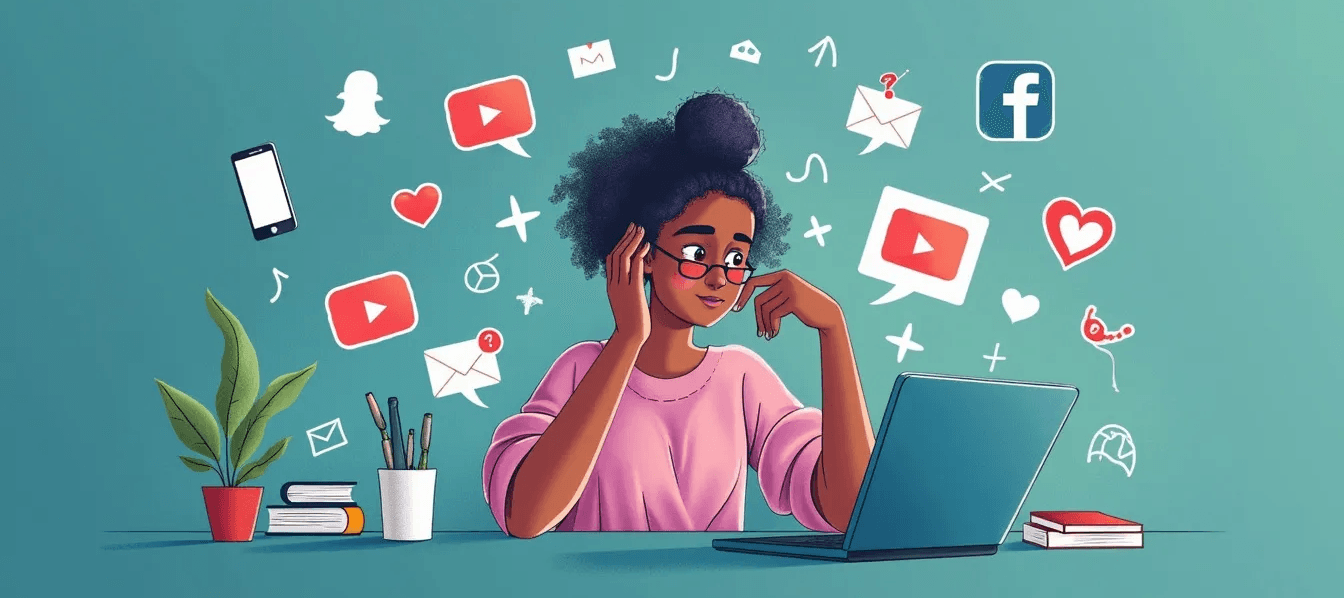The Impact of Social Media on Mental Health: A Double-Edged Sword
This blog explores social media's impact on mental health, highlighting its benefits, harms, and effects like addiction, anxiety, and FOMO. Backed by stats and examples, it stresses mindful use and offers tips for a healthy digital balance.
Shreyaan Yudeep
9/20/20243 min read


In today’s hyper-connected world, social media has become an integral part of daily life. With over 4.8 billion users worldwide as of 2023, platforms like Instagram, TikTok, Facebook, and Twitter offer unprecedented opportunities for connection, creativity, and community. But lurking beneath this vibrant surface is a darker reality—social media’s profound impact on mental health.
The Allure of Social Media: Why We Can’t Disconnect
The allure of social media lies in its ability to provide instant gratification. Whether it's through likes, shares, or comments, each notification triggers a dopamine hit, the brain's "feel-good" chemical, much like what we experience with food, exercise, or even drugs. This dopamine loop is one reason people spend an average of 2 hours and 31 minutes per day on social platforms.
While these platforms can create a sense of belonging and self-worth, they can also lead to harmful comparisons and distorted realities. Highlight reels of vacations, fitness goals, and luxury lifestyles flood users’ feeds, cultivating a sense that everyone else is living their best life—except you.
The Numbers Speak: Social Media and Mental Health
Studies have shown a disturbing link between excessive social media use and increased rates of anxiety, depression, and other mental health issues. A 2021 study published by JAMA Psychiatry revealed that adults who spend more than 3 hours on social media per day are 1.5 times more likely to experience mental health symptoms, such as anxiety and depression. For teenagers, the effects are even more pronounced, with young people reporting feelings of loneliness, inadequacy, and suicidal thoughts.
One jaw-dropping example is the increase in anxiety and depression among Gen Z (those born from the mid-1990s to early 2010s), who are digital natives. Research from Pew Research Center found that 70% of teens feel anxiety related to their social media presence, fearing they will miss out on experiences or fall behind socially if they don’t stay constantly engaged.
FOMO and the "Highlight Reel" Effect
A major factor driving social media’s negative mental health impact is the "Highlight Reel" effect. People tend to post only their best moments—perfect vacations, career achievements, or fitness transformations. This cultivates a phenomenon known as Fear of Missing Out (FOMO), where individuals constantly compare their mundane, everyday lives with others' seemingly glamorous lifestyles.
In fact, a 2020 study published in Computers in Human Behavior found that 72% of users admit to feeling inadequate after viewing others’ posts, leading to issues like poor self-esteem, anxiety, and body image concerns. Social media filters and editing apps only worsen this, as users strive to live up to unrealistic beauty and lifestyle standards.
The Rise of Cyberbullying and Online Harassment
Another disturbing aspect of social media’s influence on mental health is the rise of cyberbullying. According to Cyberbullying Research Center, 34% of students report having experienced cyberbullying at least once in their lives. The anonymity of the internet allows for cruel comments and harassment, often exacerbating feelings of isolation, depression, and, in some cases, pushing individuals toward self-harm or suicide.
One notable case is that of Molly Russell, a British teen who tragically took her own life in 2017 after being exposed to self-harm and suicide-related content on Instagram. Her story highlights the real-life consequences of unregulated social media usage, sparking global conversations on social media responsibility.
Striking a Balance: Can Social Media Be Healthy?
Despite these grim statistics, social media isn’t inherently bad. When used mindfully, it can offer real benefits—building communities, spreading awareness, and creating spaces for self-expression. But to protect mental health, it’s critical to develop a balanced relationship with these platforms.
Experts recommend taking regular “digital detoxes”, setting time limits on social media use, and curating your feed to follow accounts that uplift rather than cause stress. Platforms themselves are also becoming more involved in safeguarding users' mental health, with features like Instagram’s “Hide Likes” option and the introduction of AI-based filters to identify harmful content.
Conclusion: The Power is in Your Hands
Social media has the power to shape our mental health, for better or worse. By understanding its potential pitfalls and taking proactive steps to manage how we engage with it, we can turn these platforms into tools that promote well-being rather than erode it. In the end, the key lies in mindful usage and being aware of how these digital spaces influence our thoughts, emotions, and behaviors.
Socials
Explore thoughts, heal, thrive, lead balanced life today.
Support
Call us at : 09854069937, 09706459740
Email us at : thriveflourish09@outlook.com
Privacy Policies
Review us on Google
